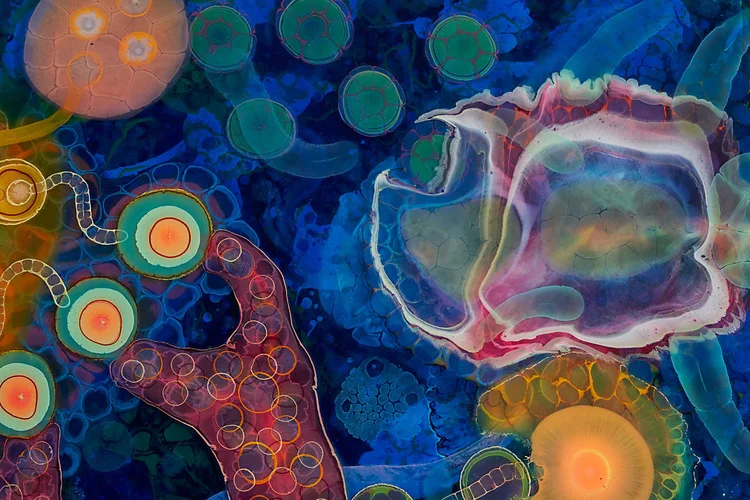Mmm
//Michele oberholtzer
© 2015 Bruce Riley, "Exploded View"
Listen — there was a time when people did not speak. The entire human vocabulary consisted of a single noise. It was an even hum, a length of m's strung together, monosyllabic and vowel-free. “Mmm” one might say, and the response would be, “Mmm” right back.
These early sounds carried only one meaning: acceptance. A birth, a death, a sunrise, a sunset, a flood, a fire, a snowflake, a bud: each was greeted without bias or emotion; it simply was, so it was simply accepted. Mmm.
Acceptance begets acceptance, so humans rarely spoke alone. When someone let out an "Mmm,” it would often catch the ear of another person who, likely enough, was feeling acceptance right at that moment, or who wished to say, “I accept your acceptance,” and would “Mmm” right back. The mmm’s merged together, and the song grew.
And, when enough humans mmm’d together at just the right tone, the hum would catch at something invisible deep in the ground. There is only one resonant frequency of the planet, and the human hum matched the chord. Vibrating like a guitar string plucked by human voices, the very Earth would sing — humming its one beautiful pure note, sounding its acceptance in return. Of all the animals, only humans could make the Earth sing with them, which is why the humans were entrusted as the Keepers of the Earth. This bond was reinforced each time they joined together in the sacred communion of acceptance. Mmm.
There was no hate, because there was no sound for it. There was no love, because there was no word for it. Emotions existed but were like shadows that the heart never cast in the universal light of acceptance. There was only one thought, only one feeling, and only one note, but it was perfectly tuned. And that was it for a very long while.
Listen — one day, a woman and a man lay together. They pushed and pulled and pulsed against each other’s bodies under the early afternoon sun. In that moment, when greatest tension gives way to greatest release, the woman’s acceptance crossed over into something more and she cried out: “Mmm!” It was the same noise every other human noise had always been, yet something about it was undeniably different. It didn’t mean “I accept” or “I acknowledge” or even “I concur” but “Yes.” She had come to know pleasure; a new word had been conceived.
With their bodies still intertwined, the man stopped and stared at the woman. Her eyes shone and her lips curled up at the edges — it was the first smile the man had ever seen. Seeing her this way, something shifted in his heart, and he understood immediately what she had meant. He spoke back at her in the new way. "Mmm.” “Yes, I agree with your agreement. What we did was good and what you said about what we did was good.” He said all that with this one sound. The feeling was utterly new but immediately recognizable. Yes.
Approval begets approval, and so the new sound spread rapidly. Humans began using their noises to agree with things: “Mmm” to a sunrise, “Mmm” to a meal, “Mmm” to pleasure, physical and otherwise. It was a beautiful time of affirmation and encouragement and approval. When enough mmm’s were hummed, the Earth still sang back. But it was weaker than before because the sound was changed, and it was shorter than before because these mmm’s caused the people to break out laughing, so great was their joy.
Listen — many years later that very same woman watched as her father lay weak on his deathbed. She had witnessed many passings in her life, but none since the new word had been born. She hummed over his frail body, a song of approval of the life he had lived and acceptance of his release from it. Suddenly, the old man’s peaceful stillness was broken by a sudden shallow gasp, and his last living breath passed through his open lips. The sound caught in the woman’s throat and the tone shifted: “Mmm!” As before, it was the same but also different. This sound meant something new. It was a rejection, a dismissal, a curse: “No.” The woman had discovered pain, and its remnants were this new word.
The other mourners looked at the woman. There was an ache in her eyes and her cheeks were wet. It was the first tear they had ever seen. The anguished sound carried a feeling that echoed in the heart of each person and the room broke out in a swell of mmm's. Together they joined to express a sorrow that they never knew existed with this new sound.
Disapproval begets disapproval, and the new sound spread rapidly. The chorus of consensus was broken and people began to speak this other mmm to lament and dissent and express discontent. It was unpleasant but satisfying. Some people tried to stop it but they could not because there can be no head without a hind and there can be no “yes” without a “no,” not for long anyway. And once their hearts had grown to know the emotion of pain, truly there was no going back. When enough mmm’s were hummed, the Earth still sang back. But it was even weaker than before because the sound was distorted, and it was shorter than before because these mmm’s caused the people to break out crying, so great was their sadness.
From there, new noises with new meanings continued to come about. Like ever-expanding concentric circles, each new sound revealed another, until there were mmm’s of every possible kind. There was an “Mmm” that meant “I’m tired,” an “Mmm” that meant "Are you sure?” There was an “Mmm” that meant "I don't know," and an “Mmm” that meant "I dare you." There was an “Mmm” that meant “I love you," and even an “Mmm” that meant “I love you too.” People were limited only by the physical range of their voices — it was an exciting and occasionally noisy time.
As the range of the mmm’s expanded, so did people’s emotional capacity. Human hearts expressed a full range of feelings to match every variation of the sound and every situation that prompted it. With so many things to communicate, there were abundant occasions to speak and the constant vibrations of the humming noises sang out all the more. The mmm’s created chords and dischords, harmonies and disharmonies. When enough mmm’s were hummed, the Earth shuddered and sputtered, but it did not truly sing as it had once before.
Listen — one day, a woman bent over a bowl of rice as she prepared a meal for her family. Suddenly, a crow landed on her shoulder and with a booming, “Maw!” he snatched a grain from her bowl and flew away. The woman was so startled that she called, “Mmmaw!” in response. Now she was doubly surprised — she had spoken an entirely new sound for the first time. With the sound came a new sort of feeling; the crow had taken something that the woman wanted and she wanted it back. She watched as the crow returned to his flock and cackled and crowed with the other birds. “Maw,” they all said to each other, and what they meant was, “Mine.”
Enchanted with the power of innovation, the woman dropped her meal preparations and ran to share her discovery with her neighbors. They heard the sound of a crow — but there was no crow in sight. Seeing her parted lips as she belted out the sound, they understood the power of this innovation, and they each wanted the new sound for themselves. They responded in turn: “Maw!”
Change begets change, and it was not long before they turned to other animals for inspiration. From the cat they adopted a rattling “prrrr;” from the dog they acquired a clipped, “rart;” from the other birds they delighted in a dizzying array of sounds from “liip” to “skree” to “walloo” and “tititi” and many, many more. People wondered how it was that they had heard these sounds so many times before but never taken them for themselves. Eagerly they stretched their mouths, lips, tongues, and throats in strange new ways, speaking in a jangle of sounds.
As the range of noises expanded, so did people’s intellectual capacity. They gained access to consonants and vowels and configurations previously untapped. Words developed, then sentences, then languages. Each new meaning gave rise to a new thought, and the human mind expanded to ever greater reaches of intelligence. Like a cauldron of entropy, new words and new ideas bubbled forth.
In time, humans became so intelligent that they learned to master the world around them. They tamed and caged wild animals, from the dogs to the cows to the occasional cat. They mined rich minerals deep in the Earth, digging to places that human hands had never touched and human eyes had never seen (though ancient human voices had moved). They engineered massive structures, tall and pointy and shiny. As their brains got smarter, and their dominion over the Earth increased, people lost respect for other beings. They began to think that their power meant they were better and that their control gave them license to exploit. They began to think that Keeper of the Earth meant People over Earth.
All the while, people talked and talked. With so much to say, they no longer bothered to “Mmm.”
A hummingbird in an orchard of diluted nectar may stick its tongue down every flower but never extract satisfaction from the faded fluid. A person in a world of modern language may lend his voice to every word but never conjugate fulfillment from the flat sounds. Words could never give what the hum gives so freely, but the humans had lost it, and knew not what they were missing. They forgot to remember the keystone beneath it all. They forgot to remember that the world used to murmur back.
Sometimes the Earth would agitate itself with a quake and a sputter, in a weak and desperate attempt to remind humans of what we are capable of together. But such tremors only made the people talk more, and the Earth, weary with the effort of strumming itself, returned back to dormancy like a bear who wakes to find that the long winter has not yet passed. The Earth has not truly resonated with its own songs for centuries.
Listen — one day, there will be a pair of lovers in a crowded bar. The voices of the happy hour crowd will clamor together and the couple will not be able to hear each other speak. Their minds will be full of thoughts but their words will be useless in the throng. So, the woman will draw close to the man and she will utter a single sound against the soft of his neck: “Mmm.” He will feel the vibration of her sound, he will feel her acceptance of that moment and of him and of what they are sharing, and he will be overcome with its purity. "Mmm" he will say in return. Their eyes will meet and they will sing their simple song together, feeling the pleasure of that noise and knowing in the base of their souls that there is some truth to what they have just done.
In time, they will have a child. They will greet her each morning, “Mmm,” and each night’s lullaby will be, “Mmm.” They will “Mmm” to her first step and fiercest tantrum and silent sighs. They will feel a quality in every mmm that removes their desire to speak and eases their need to be right and that gently hums them into an acceptance they had never known before.
Together, as a family, they will sing as one.
And because unity begets unity, more will join in. The words of the unfinished sentences will fall from people’s mouths and they will join the song. The different words and languages and tones will start off disjointed — head-wise and heart-foolish, the people will be quite tone deaf — but the sounds will merge and converge and settle into a single humble hum until each individual’s sounds engage into one perfect harmony.
They will feel something that hasn’t happened in generations, something they didn’t miss because they didn’t even know it was missing. And even as they are overcome with the simple power of their song of unity, they will be humbled by what comes next.
The very Earth will tremble.
It will tremble in recognition of a sound more powerful than all the words of all the languages that have ever been and can ever be spoken. The cows and the lions will shift in their cages, anxious as they feel the rumbling of vibrations deep beneath them. The miners low in the caves and the builders high on the skyscrapers will meet each other’s gaze in fear of the unstable ground beneath them, but the power of their unity and the purity of the chord will keep them from dropping the note.
Finally, the Earth will awaken and pick up the song. This time the sound will be different, as the carved-out caves and mounded-up mountains have altered the Earth’s shape. It will have been changed by what the people have done to it and the people have been changed by what they have done to the Earth. In the end it will not matter that the sound has changed — what will matter is that there is still a point of resonance, that there is still a frequency at which the voices of the Earth and its people intersect, and that they can still commune together after all they’ve been through.
Amidst the hum of our native tongue, humans will once again become worthy of our post as Keepers of the Earth. And even the animals will pause in perfect acceptance of that great and glorious “Mmmmmmmmm.”
//Michele Oberholtzer is a writer, engineer, activist, and bicycle bell peddler. Her writing can be found at oberdoit.com.


